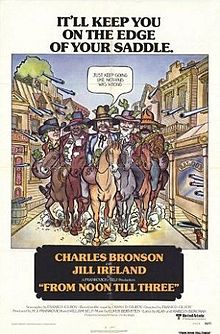
FROM NOON TILL THREE
US, 1975, 99 minutes, Colour.
Charles Bronson, Jill Ireland, Douglas V. Fowley, Stan Haze, Damon Douglas.
Directed by Frank D. Gilroy.
From Noon Till Three: Frank D. Gilroy writes and directs films with serious undertones. Is he having a holiday with Charles Bronson in a Western setting? At first, it seems so. But then, this comedy of inept bank robbers and chivalrous gunman becomes a satire on the whole glamorisation process that has gone on about the West and its heritage. But funny satire soon gives way to very grim conclusions and questions about the value of believing the legend. (one wonders Gilroy cousin to Robert Altman.) Bronson does well in this offbeat film as does his wife, Jill Ireland. There are many excellent satirical touches in this Western fairytale gone sour.
1. Audience expectations from the title, Charles Bronson film, western? Was the response in accord with expectations?
2. What was the purpose of making this film: a western, a bank robbery film, a comedy. an exposing of the myths of America? Did they blend well? Which predominated?
3. The film's visual use of dreams, especially at the beginning? Realism? Fantasy., for example.. Mrs. Starbuck's house? Fairytale and myths? From noon till three, the romance of Graham and Amanda?
4. How interesting a piece of Americana was this? The creating of legends from the nineteenth century, the nature and quality of these legends, the facts and the myths? American belief in its legends? The comparison of this legend with the legends about real people? The romantic attitudes towards the American heritage, the romantic belief in the past? The film's irony as regards disbelief in the truth? America as Mrs. Starbuck, wanting to kill itself to preserve romance? Only in a madhouse could the truth be accepted? What was the overall message of the film and its irony?
5. The significance of the dream opening, the visual humour, the banks, the revelation about Graham? His waking up and response?
6. The contrast with the real robbery? The two-bit gang and its various personalities and types? A satire on the bank robbers of the West in the nineteenth century? The failure of their attempt, compared with the dream? Their deaths?
7. How uncharacteristic of a Charles Bronson hero was Graham? What kind of a hero for this film? In his dreams, in reality? A coward? A hero who defended women and told lies on their behalf? A man who saved himself all the time? An ordinary type involved in a gang? A certain gallant attitude towards women? The story of his romance with Amanda? His sad story about impotence, leaving Amanda? The realities of the romance? The humour of it, especially the house, dressing up. the meal, the waltz etc.? The fact that he was a coward saving himself instead of the gang? The contrast between myth and reality?
8. How attractive a heroine was Amanda? The strange look of her house, a castle in the West? Her status as a widow, her prim attitudes towards life and people? Her memories of her elderly husband? Marriage, wealth and status? Her defence of her horse against the robbers? Her fear,, threatening Graham, the gun? The humour of her being seduced by his sad story? The swim together, the romance.. the meal, the dressing up, the waltz? Three hours of romance and love? Her attitude towards Graham saving his friends? Her response to his seeming death?
9. The growing fairytale about Graham and Amanda: the humour of its origin, especially in Amanda defying the townspeople. the hostility changing to admiration? The newspaperman and the dictating of the story? The publishing.. best seller? The humour of its being read all over the world? The fairytale aspects: the music, the castle, the love, the romantic waltz becoming a bestseller?
10. The contrast with Graham and his taking the place of the dentist, imprisonment, hearing the story? His return and the threat to the reality of the romance? Amanda defying him after not recognizing him? How did she change and how had she changed because of the book?
11. The ironies of Graham being arrested for the dentist, the nature of his trial, the effect of imprisonment on him?
12. The visualizing of his return to the town, seeing his grave? The humour of his disguise? The tour of the house and Amanda speaking to the guests? His confrontation of her?
13. What were audiences led to expect as regards the confrontation? Graham's wanting the truth, his ambitions to go into banking and the future for Amanda? Her refusal, the irony and pathos of her death?
14. The impact on Graham, his visiting the saloon and trying to prove his identity to the madam? His going to the play and seeing it enacted? Was it inevitable that the only place he would be accepted was the asylum? The pathos of this?
15. The ending, with the waltz being sung by Jill Ireland? How did the author and director play with western traditions, explore American values?